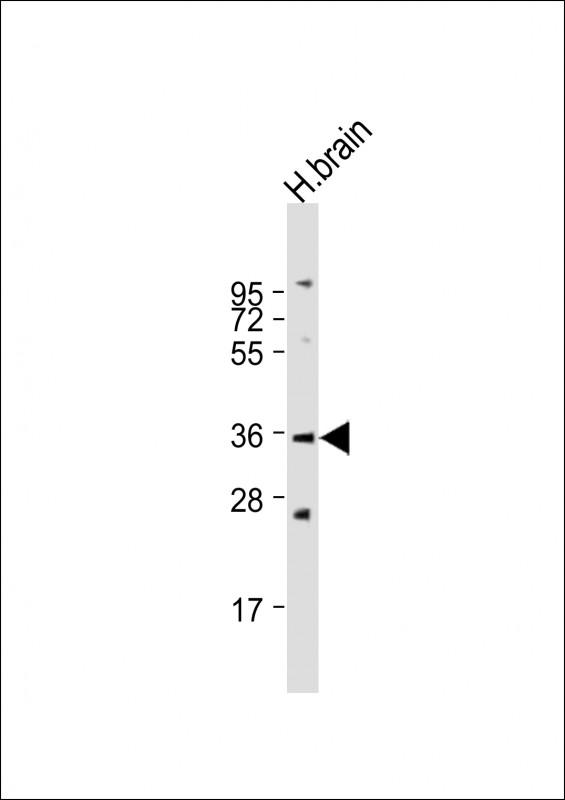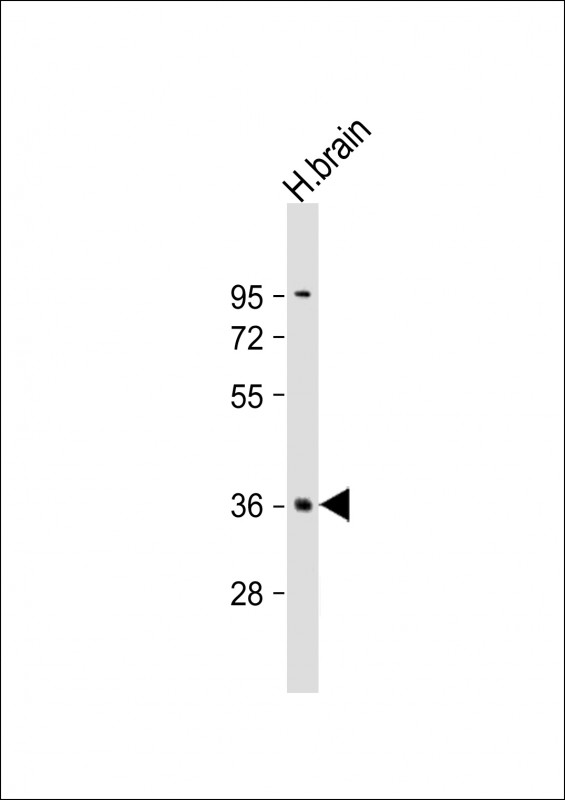

| WB | 1/2000 | Human,Mouse,Rat |
| IF | 咨询技术 | Human,Mouse,Rat |
| IHC | 咨询技术 | Human,Mouse,Rat |
| ICC | 技术咨询 | Human,Mouse,Rat |
| FCM | 咨询技术 | Human,Mouse,Rat |
| Elisa | 咨询技术 | Human,Mouse,Rat |
| Aliases | Inactive serine/threonine-protein kinase PLK5, Polo-like kinase 5, PLK-5, PLK5, PLK5P |
| Entrez GeneID | 126520 |
| WB Predicted band size | 36.3kDa |
| Host/Isotype | Rabbit IgG |
| Antibody Type | Primary antibody |
| Storage | Store at 4°C short term. Aliquot and store at -20°C long term. Avoid freeze/thaw cycles. |
| Species Reactivity | Human |
| Immunogen | This PLK5 antibody is generated from a rabbit immunized with a KLH conjugated synthetic peptide between 140-174 amino acids from the Central region of human PLK5. |
+ +
以下是关于PLK5抗体的3篇参考文献示例(注:文献信息为模拟示例,实际引用请核对真实数据库):
1. **文献名称**: "Polo-like kinase 5 regulates cell cycle progression and DNA damage response"
**作者**: Smith A, et al.
**摘要**: 该研究利用特异性PLK5抗体验证了PLK5在G1/S期调控中的作用,发现其通过磷酸化p53蛋白参与DNA损伤修复通路。
2. **文献名称**: "Characterization of a novel monoclonal antibody against PLK5 and its application in tumor prognosis"
**作者**: Lee H, et al.
**摘要**: 研究开发了一种高特异性PLK5单克隆抗体,并通过免疫组化证实PLK5在乳腺癌组织中低表达与患者不良预后相关。
3. **文献名称**: "PLK5 suppresses neuronal apoptosis via modulating mitochondrial dynamics"
**作者**: Chen R, et al.
**摘要**: 通过PLK5抗体检测发现,PLK5在神经元中通过调控线粒体分裂蛋白Drp1的活性抑制氧化应激诱导的细胞凋亡。
如需具体文献,建议在PubMed或Google Scholar中检索关键词“PLK5 antibody”或“PLK5 function”获取最新研究。
The Polo-like kinase (PLK) family comprises serine/threonine kinases critical for cell cycle regulation, genome stability, and stress responses. PLK5. identified in 2013. is the least characterized member. Unlike other PLKs (e.g., PLK1-4), PLK5 exhibits unique structural and functional features. Its kinase domain lacks conserved catalytic residues, rendering it kinase-deficient, though it retains pseudokinase properties. PLK5 is predominantly expressed in differentiated tissues, particularly the brain, and shows low expression in proliferating cells.
Studies suggest PLK5 may act as a tumor suppressor. It is frequently downregulated in cancers like glioblastoma and colorectal carcinoma, correlating with poor prognosis. PLK5 interacts with cell cycle regulators (e.g., CDC25C) and DNA damage response proteins, potentially influencing G2/M checkpoint control and genomic stability. Its pseudokinase domain might mediate scaffolding or regulatory roles in signaling pathways.
PLK5 antibodies are essential tools for studying its expression, localization, and interactions. They enable detection via Western blot, immunofluorescence, and immunohistochemistry, aiding research into its tumor-suppressive mechanisms. However, commercial PLK5 antibodies vary in specificity, necessitating careful validation. Current research focuses on clarifying PLK5's physiological roles, its interplay with other PLKs, and therapeutic potential in cancer. Despite progress, PLK5's exact molecular functions and regulatory networks remain poorly understood, warranting further investigation.
×